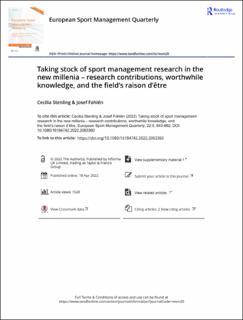Taking stock of sport management research in the new millenia: Research contributions, worthwhile knowledge, and the field’s raison d’être
Peer reviewed, Journal article
Published version
Permanent lenke
https://hdl.handle.net/11250/3034854Utgivelsesdato
2022Metadata
Vis full innførselSamlinger
- Artikler / Articles [2119]
- Publikasjoner fra Cristin [1107]
Originalversjon
European Sport Management Quarterly. 2022, 22(5), Side 643-662. 10.1080/16184742.2022.2063360Sammendrag
Research question: In this paper, we analyse the variety and distribution of ways that authors frame their research contributions in published sport management articles, thereby providing a base from which to reflect on what is considered worthwhile knowledge in the field of sport management.
Research methods: Our analysis builds on a reading of the introductions of 128 papers published in European Sport Management Quarterly, Journal of Sport Management, and Sport Management Review between 2001 and 2020. We grounded our approach conceptually in the work of [Sandberg, J., & Alvesson, M. (2011). Ways of constructing research questions: Gap-spotting or problematization? Organization, 18(1), 23–44. 10.1177/1350508410372151] but identified field-specific variations using an inductive process.
Results and findings: Most contribution-framings entail spotting gaps in the literature, in which the value of a piece of research is based on the idea that existing research is lacking in some way. Very few papers adopt a more disruptive contribution-framing mode that questions the assumptions underpinning existing knowledge in the field.
Implications: We raise potential issues of concern and important considerations for the future regarding questions around the development of a distinct body of sport management knowledge, ways to evaluate gaps in the literature, the significance of significance-statements, and the need to discuss an appropriate balance between incremental and assumption-challenging knowledge production.
Beskrivelse
This is an Open Access article distributed under the terms of the Creative Commons Attribution-NonCommercial-NoDerivatives License (http://creativecommons.org/licenses/by-nc-nd/4.0/), which permits non-commercial re-use, distribution, and reproduction in any medium, provided the original work is properly cited, and is not altered, transformed, or built upon in any way.
